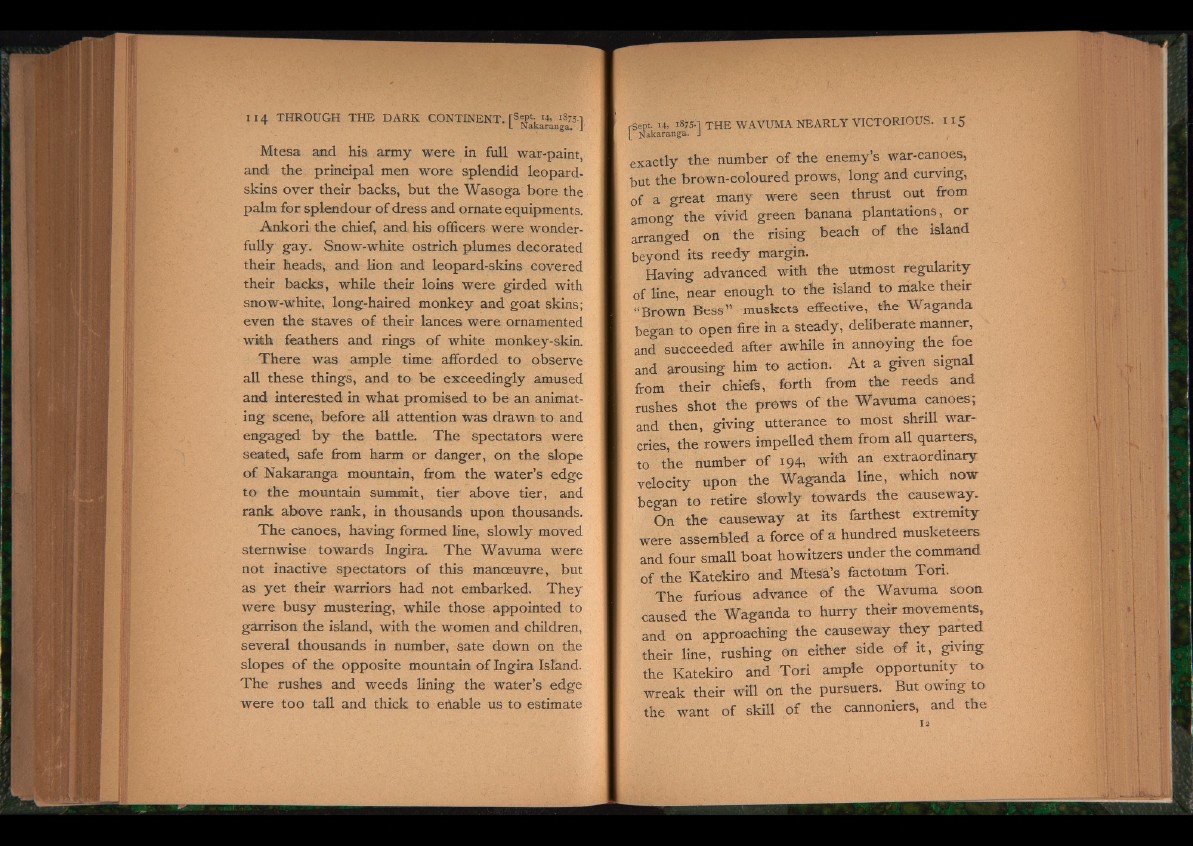
Mtesa and his army were in full war-paint,
and the principal men wore splendid leopard-
skins over their backs, but the Wa so g a bore the
palm for splendour o f dress and ornate equipments.
Anko ri the chief, and his officers were wonderfully
g a y . Snow-white ostrich plumes decorated
their heads, and lion and leopard-skins covered
their backs, while their loins were girded with
snow-white, long-haired monkey and goat skins;
even the staves o f their lances were ornamented
wkh feathers and rings o f white monkey-skin.
T h e re was ample time afforded to observe
all these things, and to be exceedingly amused
and interested in what promised to be an animating
scene, before all attention was drawn to and
engaged b y the battle. The spectators were
seated, safe from harm or danger, on the slope
o f Nakaranga mountain, from the water’s edge
to the mountain summit, tier above tier, and
rank above rank, in thousands upon thousands.
T h e canoes, having formed line, s low ly moved
stern wise towards Ingira. T h e Wavuma were
not inactive spectators o f this manoeuvre, but
as y e t their warriors had not embarked. T h e y
were busy mustering, while those appointed to
garrison the island, with the women and children,
several thousands in number, sate down on the
slopes o f the opposite mountain o f Ingira Island.
T h e rushes and weeds lining the water’s edge
were too tall and thick to enable us to estimate
rSept. 14, 1875-1 t h e WAVUMA NEARLY VICTORIOUS. XI5
[ Nakaranga. J
exactly the number o f the enemy’s war-canoes,
hut the brown-coloured prows, long and curving,
of a great many were seen thrust out from
among the vivid green banana plantations, or
arranged on the rising beach o f the island
b e y o n d its reedy margin.
Having advanced with the utmost regularity
of line, near enough to the island to make their
“ Brown B e s s ” muskets effective, the Waganda
began to open fire in a steady, deliberate manner,
and succeeded after awhile in annoying the foe
and arousing him to action. A t a given signal
from their chiefs, forth from the reeds and
rushes shot the prows o f the Wavuma canoes;
and then, giving utterance to most shrill war-
cries, the rowers impelled them from all quarters,
to the number o f 194, with an extraordinary
velocity upon the Waganda line, which now
began to retire s low ly towards the causeway.
On the causeway at its farthest extremity
were assembled a force o f a hundred musketeers
and four small boat howitzers under the command
o f the Katekiro and Mtesa’s factotum Tori.
The furious advance o f the Wavuma soon
caused the Waganda to hurry their movements,
and on approaching the causeway th e y parted
their line, rushing on either side o f it, giving
the Katekiro and T o r i ample opportunity to
wreak their will on the pursuers. But owing to
the want o f skill o f the cannoniers, and the